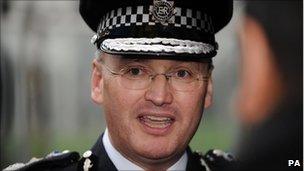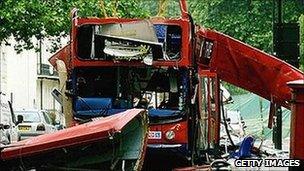Met police chief queries police health and safety rules
- Published

Sir Paul has been Met commissioner since January 2009
Police officers should be able to do their jobs without having to think about health and safety, the head of the Metropolitan force has said.
Sir Paul Stephenson questioned whether safety legislation was appropriate for the emergency services.
Concerns about their response was raised at the inquests into the deaths of those killed in the 7 July bombings.
The Police Federation said it was "disappointing" to note Sir Paul's "apparent disregard for safety laws".
The Metropolitan Police commissioner's comments in the Daily Telegraph, external came after the inquest heard emergency services were hampered by problems including health and safety regulations.
The coroner, Lady Justice Hallett, ruled the delays did not cause the death of any of those killed.
Four suicide bombers killed 52 people on London's transport network on 7 July 2005.
Lady Justice Hallett ruled the victims had been unlawfully killed.
She praised the efforts of both MI5 and the emergency services but criticised lapses, making nine recommendations, external that aim to "save lives".
Speaking to the Daily Telegraph after the inquest, Sir Paul said: "When health and safety legislation was first applied to the police in its raw form, I wondered whether it was entirely appropriate for emergency services.
"Health and safety is important for my staff but they engage in the risk business.
"Cops join the force knowing they have to put their life on the line. Thankfully very few pay the ultimate price."
He went on to say some officers do get injured, and he "applauded" them for taking risks.
"I don't want to criticise them or to be doing a risk assessment on every occasion," he said.
Referring to the bravery shown by members of the public on 7/7, he added: "The last thing we should ever do is make the families of people who have a go, be they cops or public, feel they made the wrong choices."
The inquests had heard from explosives sniffer dog handler Pc Glen Hesketh, who hit out at other officers for holding back from getting on the bombed Tavistock Square bus to help the injured.
'Clarity of interpretation'
"I seem to recall when I joined in the 80s they said our priority was to save life, and I think that's really what took precedence," he said.
Paul McKeever, chairman of the Police Federation, said: "It is extremely disappointing to note Sir Paul Stephenson's apparent disregard of health and safety laws that are designed to protect everyone."

Four suicide bombers killed 52 people and injured more than 700 in the attacks in London in 2005
But Chief Constable Peter Fahy, of the Association of Chief Police Officers, supported Sir Paul on the question of health and safety.
He said: "The situations that police officers work in can be fast moving, complex and require decisions to be made quickly.
"Officers still have some concerns that their actions will not be judged in terms of the particular pressures they faced at the time of an incident but viewed with the benefit of hindsight in the cold light of day."
The coroner at the 7 July inquests said the problems encountered by the emergency services had not led to any deaths.
She said: "I'm satisfied on balance of probabilities that each victim would have died whatever time the emergency services had arrived."
But she said they must work better with each other at major incidents to help them respond more quickly and "hopefully prevent future deaths".
All the services encountered "real difficulties" in locating each other in the immediate wake of the bombings.
Among several recommendations in the report were calls to review inter-agency major incident training, to review the way Transport for London is alerted to major incidents affecting the Tube network, and to look at how rendezvous points are established for emergency services in such incidents.
Heads of the emergency services said they were proud of the work done by police, paramedics and firefighters on the day, adding they would take time to digest the coroner's recommendations.
- Published6 May 2011
- Published6 May 2011